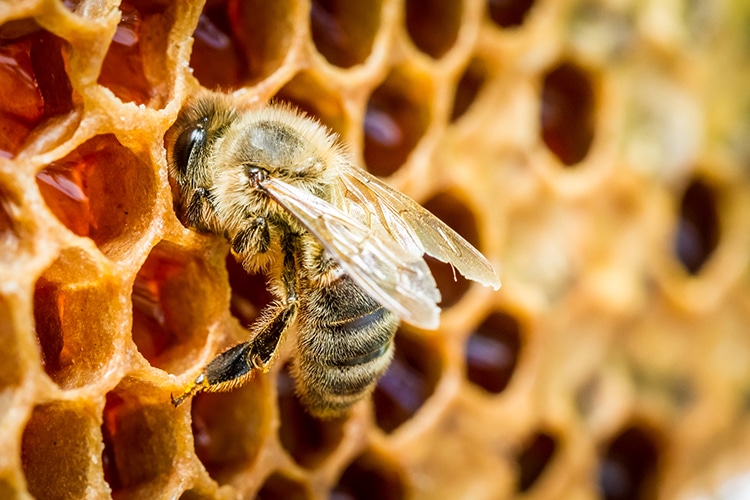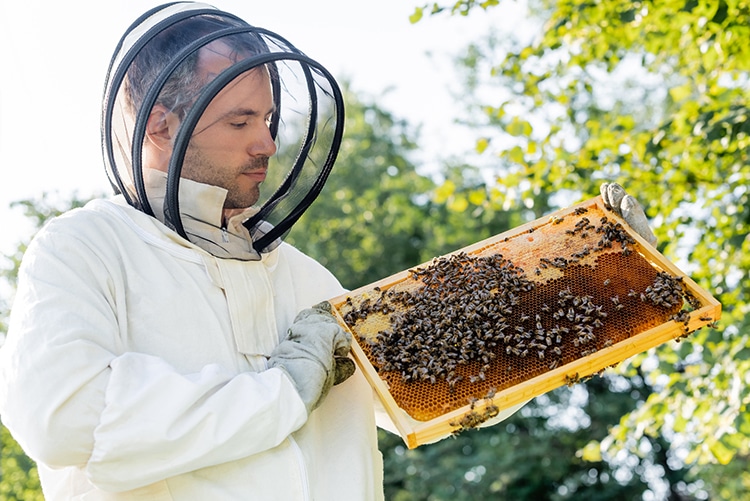Can Bees Feel Emotions? New Study Suggests They Are Sentient

Photo: SHAIITH79/Depositphotos
This post may contain affiliate links. If you make a purchase, My Modern Met may earn an affiliate commission. Please read our disclosure for more info.
Bees are critical to American agriculture. They pollinate over $15 billion worth of crops across our country each year. But lately, habitat destruction and colony collapse disorder have wreaked havoc on these incredible creatures. As useful as they are to humans, bees do not receive the same care and concern over their emotional wellbeing as other agricultural animals. The tiny critters have brains the size of poppy seeds, yet recent research by ecologists such as Stephen Buchmann suggest they can learn, think, and even likely feel, much like mammals.
Buchmann's recent book, What a Bee Knows: Exploring the Thoughts, Memories and Personalities of Bees, collects the work of bee scholars as they work to unpack what goes on in their minuscule brains. What has until recently been a “fringe” scientific field, the insect minds of bees hold a critical place in the American economy. Buchmann's work also suggests they should hold a special place in our ethical scheme. For Buchmann and some other scientists, what they have learned about bees changes their research strategies to be more ethical, on par with the standards set for vertebrate mammals such as mice and monkeys.
Experiments, the outcomes of which are addressed in the book, illuminate the sentient secret life of bees. Lars Chittka, a University College of London professor in sensory and behavioral ecology, did an experiment 16 years ago where he hid a robotic predatory spider in flowers. The spider would grab an unwary bee that came too close and then release it after giving it a good scare. Chittka observed how the released bees learned to look for the spider and to avoid it. He also observed an almost PTSD-like symptom among the previously captured creatures. Some would be too scared to approach even unoccupied flowers.
Other studies demonstrated that bee brains saw rushes in dopamine and serotonin when they were presented with sucrose (sugar). These happy bees then foraged more than their unrewarded peers. By contrast, stress from poor handling lowered the levels of these happy hormones. Bees must also keep good memories, so that they can return to the best flower patches. “This is not a trivial challenge,” says Chittka. “Different flowers are blooming from one week to the next. And a flower patch you discovered in the morning that was rewarding might be depleted by competitors half an hour later so you have to readjust.”
“Many of my colleagues do invasive neuroscience experiments where bees have electrodes implanted into various body parts without any form of anesthesia,” Chittka says. “The current carefree situation that [invertebrate] researchers live in with no legal framework needs to be re-evaluated.” There are few regulations regarding bee welfare. Vegan favorites such as almond-milk can actually be brutal on bee populations, which are imported en masse to California to pollinate almond groves. Hives have lost increasing numbers of bees in recent years, causing much to be worried about. Buchmann and others have an inkling the “unhappiness” of bees might be a contributing factor to the troubles the species faces.
Bees are critical to feeding the world and to plant survival. But the bees need care too. “The ground used to be buzzing with bees,” Buchmann said of past almond groves. “But no more. Now the almonds fall on bare ground or plastic sheeting and are vacuumed up by big harvesting units.” Reforestation and wild flowers can only do so much. The first step in safeguarding the precious bees is learning more about them and their lives. “These unique minds, regardless of how much they may differ from our own, have as much justification to exist as we do,” says Chittka. “It is a wholly new aspect of how weird and wonderful the world is around us.”
Although a bee has a brain the size of a poppy seed, recent studies have shown that the tiny creatures can learn, think, and perhaps even feel emotion.

Photo: IGORVETUSHKO/Depositphotos
h/t: [The Guardian]
Related Articles:
Cluster of Bees Fighting for Dominance Wins Top Wildlife Photography Award
Scientists Develop a Vaccine That Could Help Save the Honey Bees
Honey Bees Become Unconventional Collaborators by Completing This Artist’s Embroidery
Bus Stops Across Europe Are Getting “Living Roofs” To Help Bees Thrive
READ: Can Bees Feel Emotions? New Study Suggests They Are Sentient

0 Commentaires